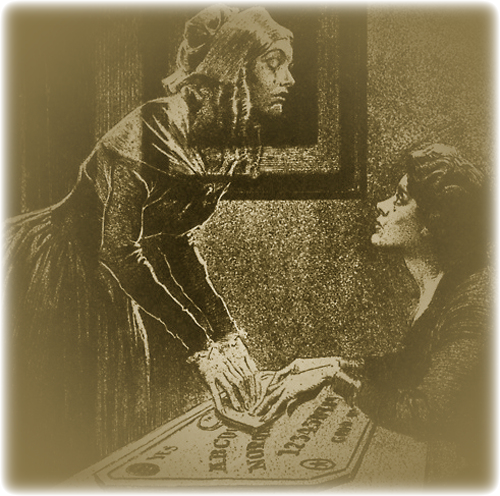Worth, Patience
Patience Worth is a Famous automatism case involving a drop-in communication with a literary bent. Patience Worth, as the spirit identified herself, began communicating to a St. Louis housewife, Pearl Curran, through a Ouija board (see Talking Board) on July 8, 1913. The pointer spelled out the message,
“Many moons ago I lived. Again I come. Patience Worth my name.”
Worth said little about herself, acknowledging only that she had been born in 1649 in Dorsetshire, England, to a poor family. She had never married, but had gone to the American colonies, where she was killed in an Indian massacre. Through Curran, Worth began to dictate various literary works that consumed years of effort.
For five years, Curran relied on the Ouija, and then she began to recite letters while the pointer circled the board. By 1920, she dictated in automatic speech. The works were published and found an enthusiastic popular and critical audience. In the first five years, Worth’s oeuvre totalled four million words in 29 volumes: 2,500 poems, plays, short stories, allegories, epigrams, and six full-length historical novels set in different periods.

The most popular novels were The Sorry Tale, a 300,000-word epic about the life of Jesus that took more than two years to dictate, and Hope Trueblood, set in Victorian England. Other novels were Telka, The Pot Upon the Wheel, Samuel Wheaton and The Merry Tale.
Worth also dictated poetry on demand. The Mediumship began to deteriorate in 1922, possibly due to emotional changes in Curran’s life with her first pregnancy (at age 39) and the deaths of her husband and mother. Public interest also waned, and Worth made fewer appearances. Curran died in 1937.
Scholars have analyzed the Worth works and found them to be authentic in historical detail. Plots and characters are well developed. However, the Old English used by Worth does not appear much in writings later than the 13th century.
It is possible that Curran (who left school at age 14) was reaching into her own unconscious to obtain the material, though it seems unlikely that an uneducated person would have such knowledge of historical periods and such literary skill. The case remains inconclusive.
SEE ALSO:
FURTHER READING:
- Litvag, Irving. Singer in the Shadows: The Strange Story of Patience Worth. New York: Macmillan, 1972.
- Prince, Walter Franklin. The Case of Patience Worth. Boston: Boston Society for Psychic Research, 1927.
SOURCE:
The Encyclopedia of Ghosts and Spirits – Written by Rosemary Ellen Guiley – September 1, 2007